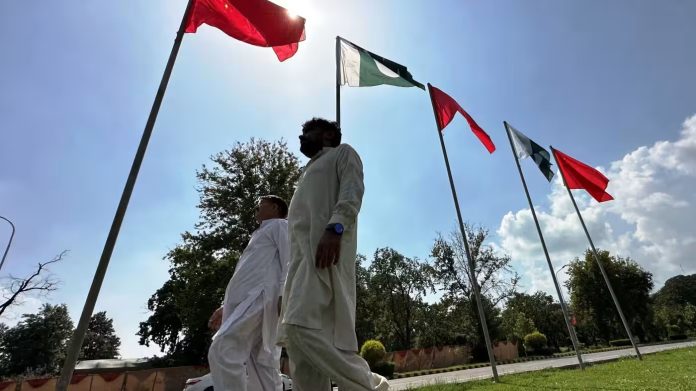ISLAMABAD — Pakistan’s elections have cemented the rise of a local rights activist in the southwestern port of Gwadar, potentially affecting China’s Belt and Road Initiative projects in the area.
In the Gwadar constituency of the Balochistan provincial assembly, voters elected Maulana Hidayat ur Rehman, leader of the Gwadar Rights Movement. The organization contends that the needs and grievances of the local population have been ignored by Islamabad, and that the benefits of the Belt and Road have not trickled down.
Gwadar’s port is considered the heart of the China-Pakistan Economic Corridor (CPEC), the $50 billion Pakistani component of the Belt and Road. At times, Rehman has been a thorn in the side of both Islamabad and Beijing, and analysts say his new position in public office could alter the dynamics.
Nasir Sohrabi, president of the Rural Community Development Council of Gwadar, believes there is a perception in Gwadar that local voices are not taken into account when making decisions about the CPEC. “[Rehman] will aim to make CPEC projects in Gwadar people-centric, and his stance will matter,” he told Nikkei Asia.
This follows tumultuous elections that were marred by violence as well as allegations of manipulation, which the election commission denies. Former Prime Minister Shehbaz Sharif looks poised to led a coalition government, although his party, the Pakistan Muslim League-Nawaz (PML-N), won fewer seats than a cast of nominally independent candidates backed by the Pakistan Tehreek-e-Insaf (PTI) party of jailed former Prime Minister Imran Khan.
Election day was rocky in Gwadar itself, as there were as many as 15 low-intensity bomb blasts in the district, according to local media. Balochistan province is home to several separatist groups and other militants.
Rehman, commonly known simply as Maulana — a term for Islamic scholars — won his race by over 4,500 votes. He defeated Hammal Kalmati, scion of the Kalmati political clan that has dominated local politics for decades, who had gone undefeated since 2008.
Active in Gwadar politics for more than a decade, as part of the Jamaat-e-Islami Islamist party, Rehman’s fortunes took a turn in August 2021 when he staged a sit-in protest for the rights of Gwadar residents. He went on to establish the Gwadar Rights Movement, giving voice to public grievances over security checkpoints, deep-sea fish trawling believed to be hurting local catches and restrictions on border trade with Iran.
Bahram Baloch, a political commentator based in Gwadar, said that Rehman successfully tapped into public sentiment. “He took a categorial stance against deep-sea fish trawling and that made him a popular leader in Gwadar,” he said.
Tania Baloch, another Balochistan analyst based in Canada, thinks Rehman essentially used the Gwadar Rights Movement as a springboard to get elected. “People of Gwadar, who are largely fishermen, supported Maulana in the election because he also comes from a fishermen family,” she said.
Rehman at times has directed his pressure at China, which on Feb. 8 had described Pakistan’s elections as “an internal affair” at its last Foreign Ministry briefing before the Lunar New Year.
Gwadar’s port was built by China in 2006 and is operated by a Chinese company. Beijing is also financing the construction of New Gwadar International Airport, which will be one of Pakistan’s largest airports once it opens for flights later this year.
In December 2022, Rehman closed the entrance to the port in protest, and also warned Chinese citizens to leave Gwadar. In reaction, the local police cracked down on the demonstrators and jailed Rehman from January to May 2023.
Less than a year after his release, Rehman has been elected to the provincial assembly and become a key stakeholder in discussing Gwadar projects with the Pakistani and Chinese governments.
Sohrabi at the Rural Community Development Council said that he has been critical of the concession agreement under which China Overseas Ports Holding Company is running Gwadar’s port. “He will raise his voice to amend this agreement and he will also push for hiring locals of Gwadar in the CPEC projects,” Sohrabi predicted.
Rehman’s election means he will also become a member of the governing board of the Gwadar Development Authority (GDA), the body responsible for all kinds of projects in the town. “[Rehman] can hold the GDA accountable and pressure it to address the real development needs of the people,” Sohrabi added.
A government official, speaking on condition of anonymity, told Nikkei Asia that China was “annoyed” when Rehman led the 2022 protest that blocked the port. But “now that the people of Gwadar have elected [him], Beijing will be more inclined to listen to his demands.”
Tania Baloch agreed. As a veteran journalist who reported on Gwadar extensively in the past, she believes the CPEC has done little for local people. But she expects Rehman to “push for making the locals of Gwadar beneficiaries of CPEC projects, and both Pakistan and China will have to listen to him since he is an elected representative now.”
That said, there are limits to what Rehman can achieve, even with a provincial seat. “He can raise his voice and protest in the assembly for the rights of Gwadar, but he does not have any executive powers,” Sohrabi said.”
The personal stakes are high for the newly elected assemblyman, as well.
Tania Baloch said that Rehman has to deliver for the people of Gwadar. “If he succeeded even in resolving part of the problems of Gwadar, he will maintain his popularity,” she said. On the other hand, “Failure to deliver will make Maulana a one-off success in the electoral landscape of Gwadar.









































